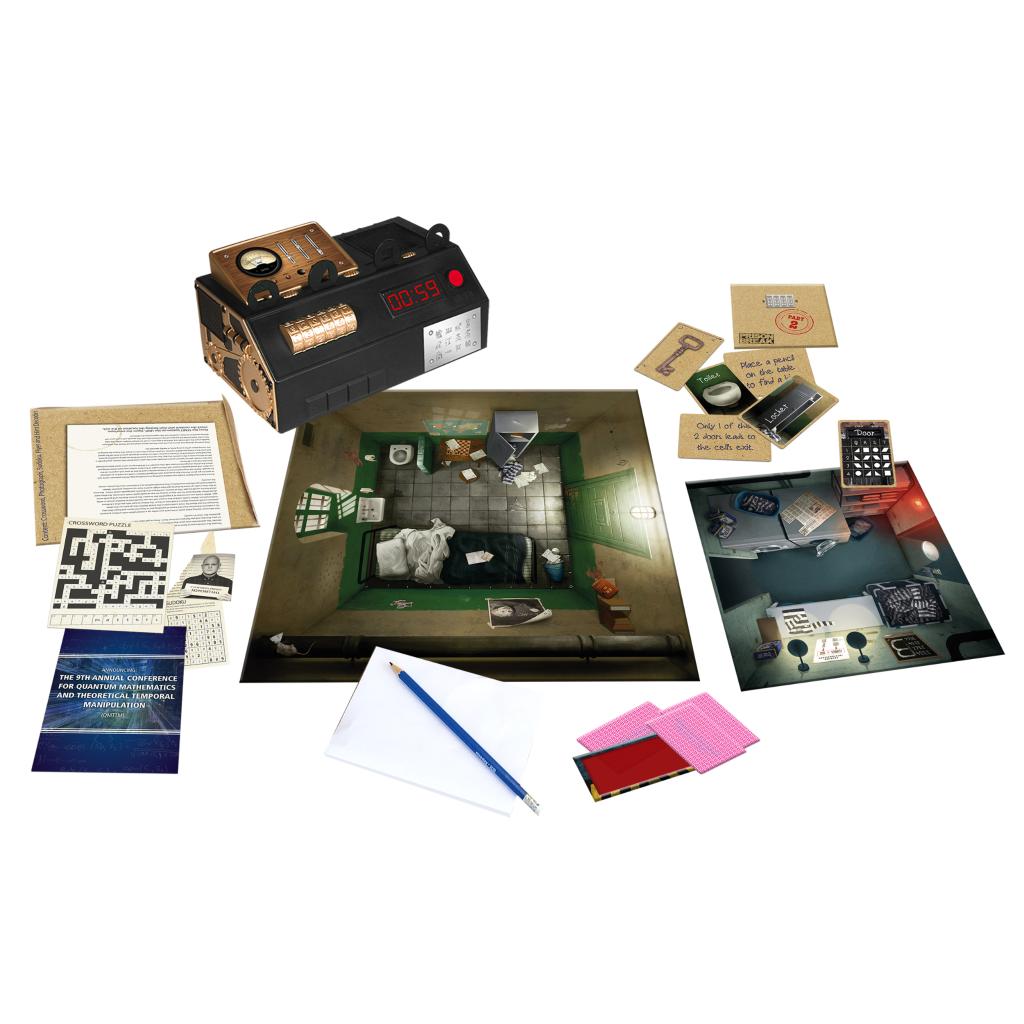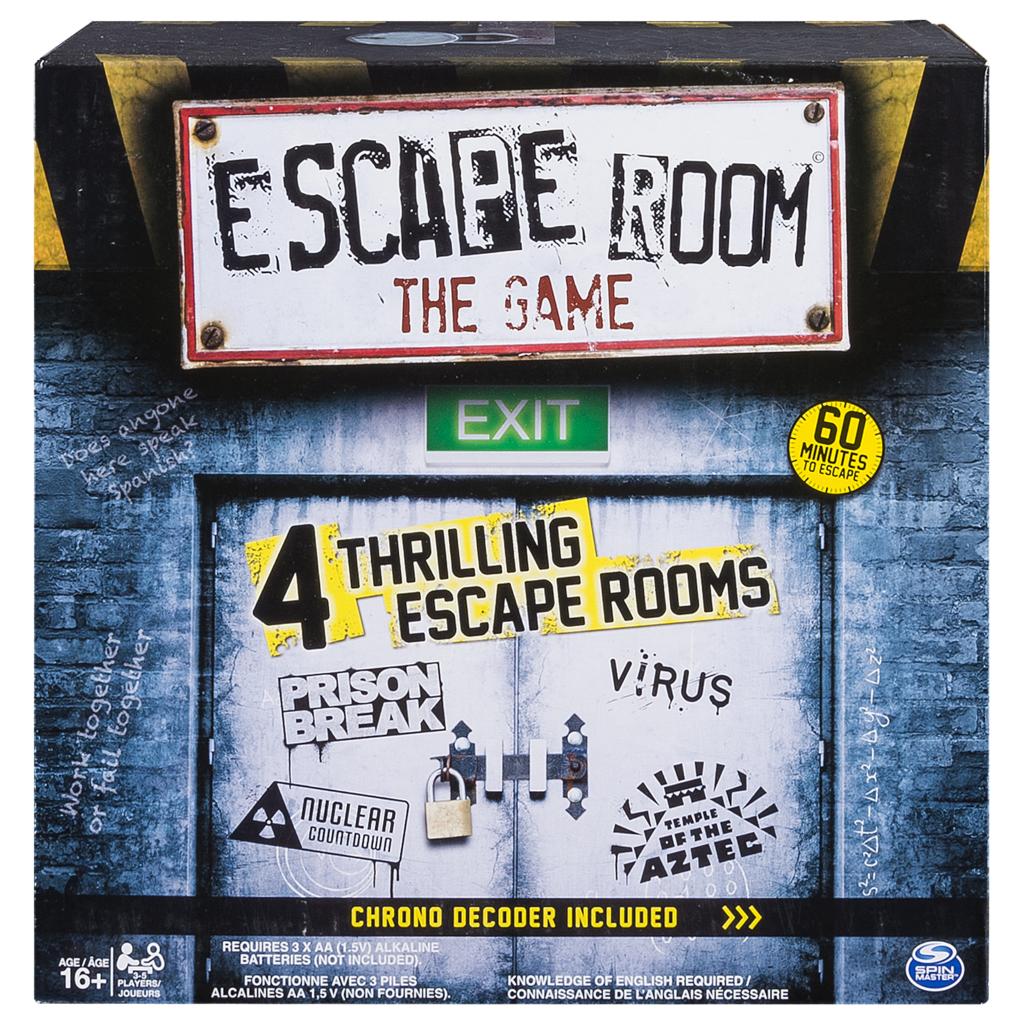Publisher:
Spin Master (US/Canada)
Designers:Unknown (boo!)
Artist:Roland MacDonald
Languages:English, French, German, Dutch, Spanish & many more
# of Players:3-5
Age:16+ (10+ in my opinion)
Duration:60 min
BoardGameGeek References:
Game Design & Mechanics
 |
| Picture from the manufacturer's website |
- The central piece of this game is a custom electronic module called the "Chrono-Decoder". The Chrono-Decoder fills multiple roles. In addition to being a timer, it provides nicely irritating sound effects 😇, it sports multiple code cyphers on its sides, and it only acts as the physical manifestation of every single lock you'll encounter in the game.
- The game also includes a series of plastic keys. They come in 6 different designs, and each of them sports some characteristics (a letter, a digit, a roman numeral, a geometric shape, etc). Depending of the scenario you're playing, one of these characteristics will help you find which 4 keys to put in the Chrono-Decoder. Put in the wrong keys, and 1 minute of your remaining time will be taken away.
- Each scenario (there are 4 included in the game box) is made of envelopes clearly marked "Part 1", "Part 2" and "Part 3". Players read the introductory text, start the timer, then open Part 1. They're not allowed to move on to Part 2 until they've entered the right keys into the Chrono-Decoder. Then it's Part 3, and getting the third set of keys will result in a little victory fanfare.
- At some specific time, the Chrono-Decoder will let out a little chime to let you a new hint card is available to you. Those cards use a classical "red filter" decoder to give a bit a nudge. Be warned, though - if the hint you get is helpful, then you're kinda running late. 😎
Pros
- Let's cut to the chase here: as write this, this game is my favorite. Each scenario does a great job at recreating the same kind of puzzle-solving, visual inspection and logical deductions you see in real-life Escape Rooms. UPDATE: See the Comments section.
- Every part of every scenario is non-linear to some extent. A couple players can easily "search a room" while others work on more menial tasks.
- Speaking of room searches, every scenario includes at least one "room map" that unfolds into something big enough for a few people to inspect simultaneously.
- Some scenarios will include "disposable" clues that meant to be written on / folded / cut off during your playthrough. Replacements can then be printed off the game's website.
Cons
- In many instances, the storyline feels a bit "tacked on", and it becomes hard to feel a connection between the keys we're looking for and the supposed events happening in the background. Then again, that's something that can be said about most of the Escape Rooms I've played...
- The price is pretty steep, especially knowing that this single purchase will provide you with 4 hours of entertainement, at best. As a possible workaround for this, consider reselling / joining a group purchase / renting the game from a boardgame library or club.
- It's not something I personally felt, but a couple fellow players pointed out they didn't like the fact that, due to the game being split into parts, they knew exactly how well they were doing. It's true most escape games will keep you guessing until the last minute.
House Rules & Suggestions
Should you play this and want to compare your performance with friends, I suggest you do the following:
- Every player must pause while hints are being read
You're encouraged to use the hints (like I said, if they're helpful you're already struggling in my book), but I like the idea of them having a (tiny) cost. - Alternate hints for "Nuclear Countdown"
The Nuclear Countdown scenario, while one of the most entertaining, has a few bits I don't find quite fair. When you play that scenario, I suggest you consider the following: - Replace the 45-minute hint with the following:
- At the 35-minute mark, add this extra hint for Part 2:
Currently Out (underline bold titles are those I've played)
- Prison Break
- Virus
- Nuclear Countdown
- Temple of the Aztec
- Welcome to Funland
- Murder Mystery
- Casino
- Secret Agent
- The Dentist
- The Legend of Redbeard's Gold
- The Magician
- The Basement (Introductory mini-scenario)
- Alice in Wonderland
- Dawn of the Zombies
- Panic on the Titanic
- Another Dimension
- Wild West Express
- The Switch (also known as "The Break-In")



